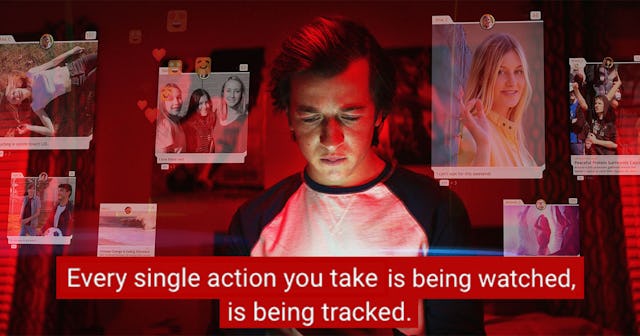Netflix's 'The Social Dilemma' Is Freaking Everyone The Hell Out

The documentary explores the dangers of social networking in a new way
If you’ve not yet seen The Social Dilemma, you need to. If you’re paying attention, the documentary doesn’t necessarily blow your mind with new observations — silent family dinners, the negative impact on kid’s mental health, targeted advertising based on pages you like or articles you’ve read — but it does confirm one haunting detail. They knew. The companies and developers that created social networking knew the damage it was causing to our overall wellbeing and democracy, and they built it anyway.
The documentary-drama now available on Netflix explores the dangerous toll social networking has taken on our society, told by the tech experts and executives Jeff Orlowski gathered from Facebook, Google, Twitter, Instagram, and Pinterest to explain to viewers exactly how it works — and why.
“Never before in history have 50 designers made decisions that would have an impact on two billion people,” says Tristan Harris, a former design ethicist at Google. While this may seem like a, “What did you think they were doing?” sort of moment for some, when they explain the fact that the human brain has not, cannot, and never will evolve at the same pace as technology, it puts what we’re up against into frightening perspective.
Virtual reality pioneer Jaron Lanier seems to nail what happens when a “free” service run entirely off advertising dollars is allowed access to our daily lives. We become the product being sold. “It’s the gradual, slight, imperceptible change in your behavior that is the product. That is the only possible product.” Harvard University professor Shoshana Zuboff adds, “[Social media] is a marketplace that trades exclusively in human futures… and those markets have produced the trillions of dollars that have made Internet companies the richest companies.”
What started as a way to share family photos and keep us with friends from far away has become platforms that impact our elections, tell us what to think, what to buy, and impact our children’s mental health at alarming rates. Between 2009 and 2017 (when smartphones, social media, and texting grew), rates of depression among kids ages 14 to 17 increased by more than 60% and rates of suicidal thoughts, plans, and attempts all increased significantly, and in some cases more than doubled, a study published in the Journal of Abnormal Psychology found.
The experts that created these networks all said the intent was to do social good. And while that may be true to a point, they also knew how addictive these platforms would become. I watched the documentary with my 17-year-old daughter who, throughout the program, continued to check Snapchat. When I explained the irony, she said, “I know. It’s hard to stop.” They knew this would happen and they did it anyway, all the while targeting these services to kids exactly her age.
A compelling point is learning that these tech experts (many of them parents) regulate, if not outright ban, the use of the apps they created. If watching The Social Dilemma makes you angry, sick, and generally feeling like you want to remove all social media apps from your lives forever, you are not alone. At a minimum, it should make us sit up, listen, and take action when it comes to regulation measures that need to be put in place in the tech industry.
For those of us with kids who may never know what it’s like to live without the constant barrage of likes, notifications, and advertising in their lives 24 hours a day, it feels like the least we can do.